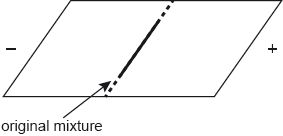| Date | November 2018 | Marks available | 2 | Reference code | 18N.3.hl.TZ0.8 |
| Level | HL | Paper | 3 | Time zone | TZ0 |
| Command term | Describe | Question number | 8 | Adapted from | N/A |
Question
Enzymes are mainly globular proteins.
Describe the interaction responsible for the secondary structure of a protein.
Explain the action of an enzyme and state one of its limitations.
Contrast the actions of non-competitive and competitive inhibitors of an enzyme and state their effects on the maximum rate of reaction, Vmax, and the Michaelis–Menten constant, Km.
Markscheme
hydrogen bonding ✔
between C=O and H–N «groups» ✔
Accept a diagram which shows hydrogen bonding for M1 and which shows the interaction between O of C=O and H of NH groups for M2.
Accept “between amido/amide/carboxamide” but not “between amino/amine” for M2.
Enzyme action:
Any two of:
substrate binds to active site ✔
weakens bonds in substrate ✔
lowers activation energy
OR
provides alternate pathway ✔
increases rate of reaction
OR
acts as catalyst ✔
substrate specific ✔
Limitation:
Any one of:
temperature dependent ✔
pH dependent ✔
can be sensitive to heavy metal ions ✔
sensitive to denaturation ✔
can be inhibited ✔
substrate specific ✔
Accept “favourable orientation/conformation of the substrate «enforced by enzyme»” for M1.
Do not accept “substrate specific” as both an enzyme action and a limitation.
Award [1] for each action.
Award [1] for any two effects stated correctly.
Award [2 max] if both actions and effects are switched to incorrect inhibitor types.


